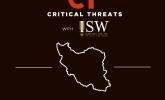Russian Offensive Campaign Assessment, November 11
November 11, 2022 - ISW Press
Ukrainian forces are completing the liberation of the western (right) bank of Kherson Oblast after the Russians retreated from it. The Russian Ministry of Defense (MoD) claimed that Russian forces completed the withdrawal to the eastern (left) bank of the Dnipro River at 5am local time on November 11. While contingents of Russian soldiers likely remain on the west bank, they are likely scattered throughout the Oblast and attempting to retreat as Ukrainian forces push towards the Dnipro River, although some may have remained behind to attempt to conduct partisan activities in small groups. It is unclear how many Russian soldiers remain on the west bank at this time. Russian sources noted that the withdrawal lasted three days and claimed that 20,000 Russian personnel and 3,500 units of military equipment moved across the Dnipro River.








